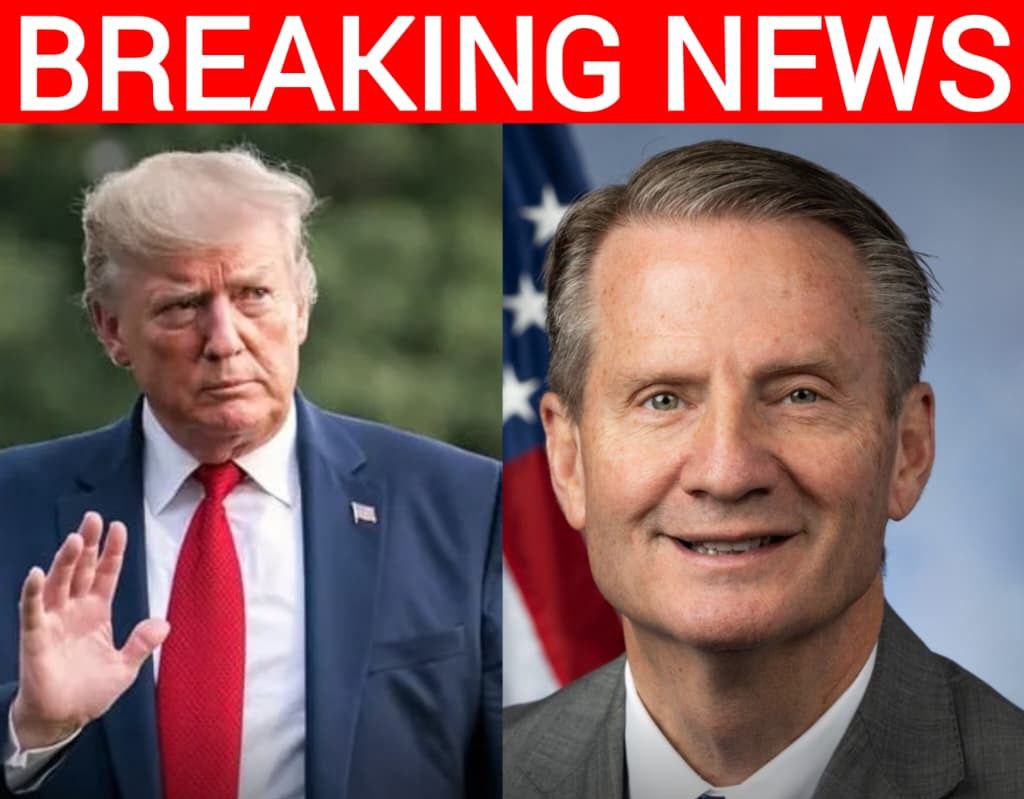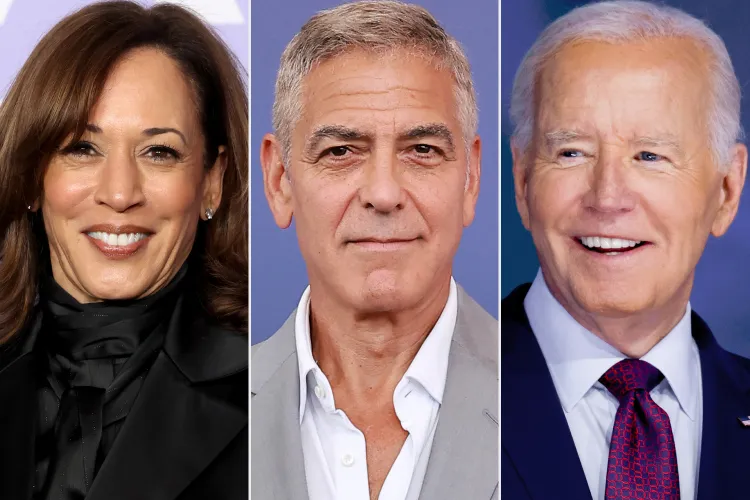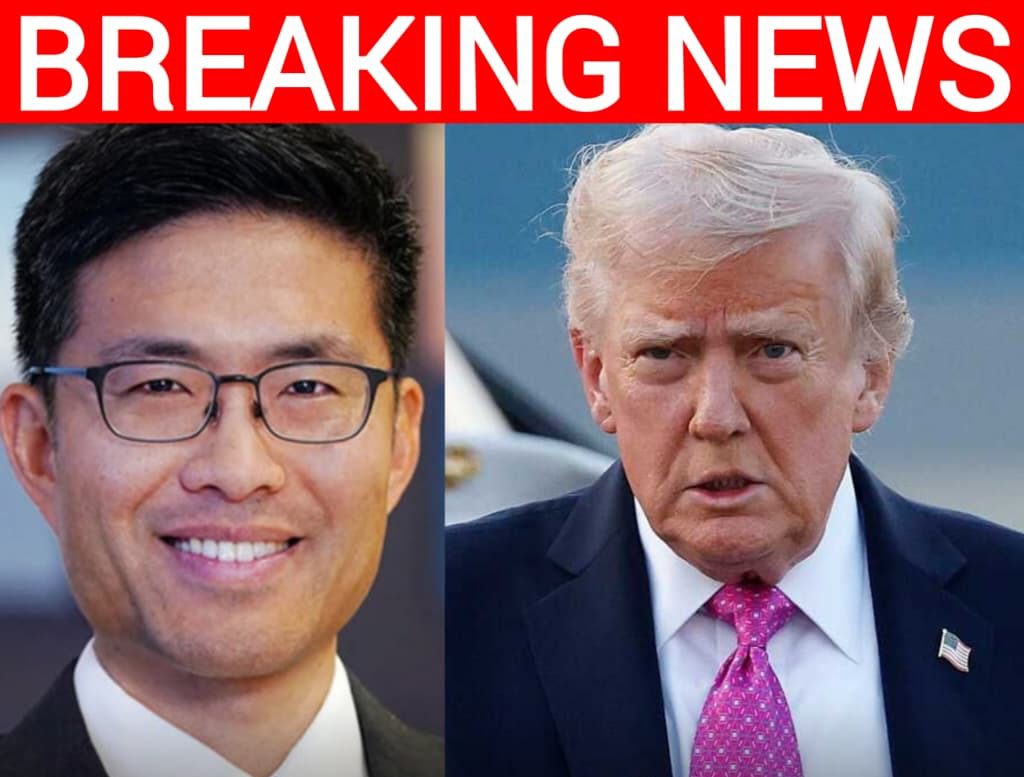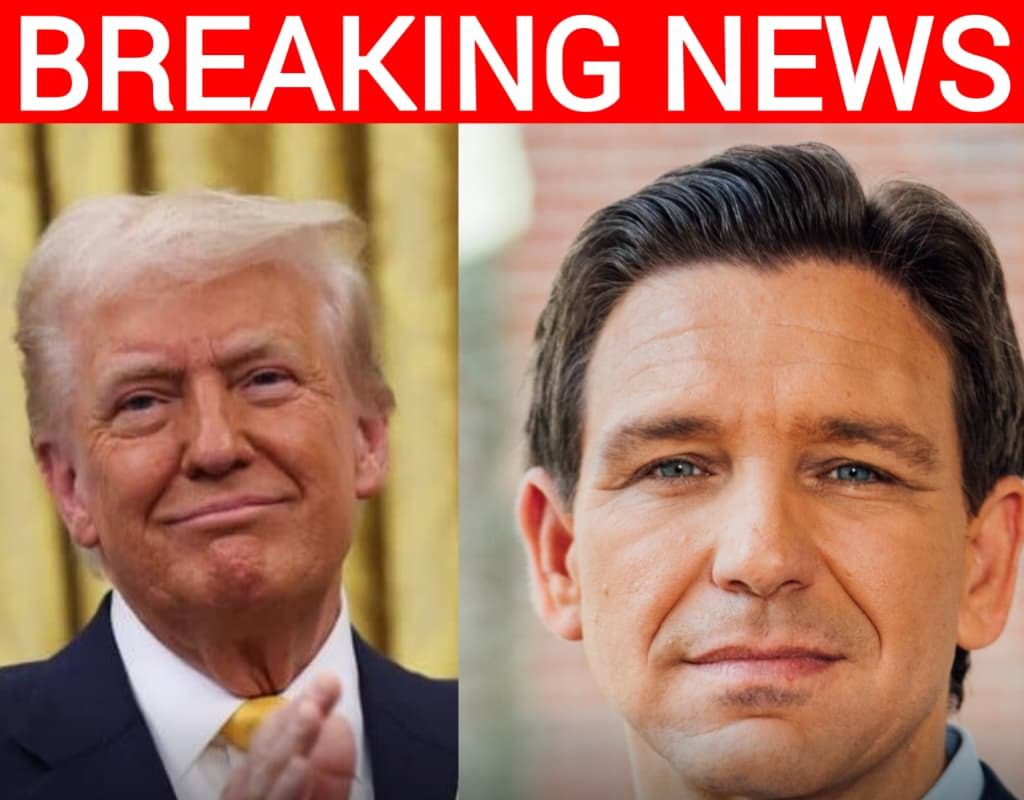President Donald Trump Endorses Tim Burchett for Reelection — A Bold Strategic Signal for America First Agenda and GOP Momentum
President Donald Trump’s endorsement of U.S. Representative Tim Burchett (R-Tennessee) comes at a moment packed with opportunity—and symbolic weight. Stimulated by a carefully crafted Truth Social post, the former president declared that Burchett is “an America First Patriot… doing a fantastic job representing Tennessee’s 2nd Congressional District.” The endorsement noted Burchett’s prior service as Knox County Mayor, state legislator and now U.S. Congressman, applauding his record on economic growth, tax cuts and regulation relief, Made-in-USA manufacturing, American energy dominance, border security, migrant-crime reduction, military and veterans support, election integrity, and defense of the Second Amendment. The message concluded that Burchett has Trump’s “complete and total endorsement for re-election — he will never let you down.”
To understand the strategic importance of this endorsement, it is necessary to look at three intertwined elements: the man being endorsed, the endorser’s current landscape, and what the timing suggests for both.
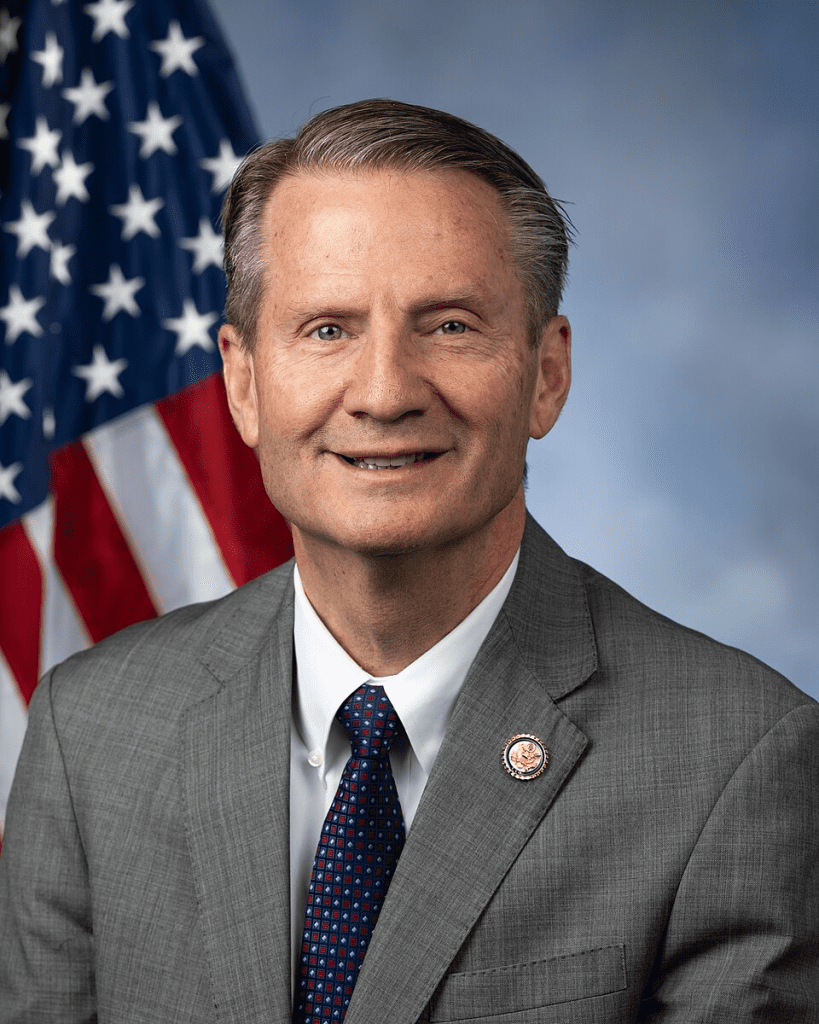
Tim Burchett has represented Tennessee’s 2nd Congressional District since January 2019, following service in the Tennessee State House and Senate and as Mayor of Knox County from 2010 to 2018. Known for his blunt style, willingness to buck leadership when he deems it necessary, and for defining himself as a staunch conservative voice, Burchett has earned a reputation among Republicans as someone unafraid to challenge the status quo. He flagged himself early as a critic of establishment Republicans and actively embraced the America First-style alignment that Trump championed. He voted, for instance, to remove the then-Speaker of the House in 2023, aligning with the insurgent mood in the GOP. Although he had fiscal-hawk credentials and once opposed big spending bills, by early 2025 he publicly shifted to support the “One Big Beautiful Bill” budget package after a call with Trump. That pivot underscored both the gravitational pull of the Trump orbit within Republicans and Burchett’s recognition of the changing power dynamics.
For Trump, this endorsement serves multiple purposes. First, it reaffirms his position as a king-maker inside the GOP, underscoring that his backing can still mobilize attention and resources. At a time when the Republican Party is searching for coherence, his endorsement of a solid loyalist like Burchett sends a signal that America First policies—Made in USA, energy dominance, border enforcement, Second Amendment protections—are not just rhetorical but remain foundational. The energy dominance element of the endorsement even made waves in financial markets commentaries, as analysts connected Burchett’s energy-first agenda with broader sectoral gains.In Tennessee, the endorsement strengthens Burchett’s profile within the Republican base. In a safely GOP district anchored around Knoxville, the Trump back-stamp helps immunize him against intra-party challenges while bolstering his credibility with voters who still rally to the former president’s banner. More than that, it binds Burchett’s campaign narrative to Trump’s enduring themes—jobs, manufacturing, security. That kind of association may discourage potential rivals and energize supporters who see the Trump link as a badge of authenticity.
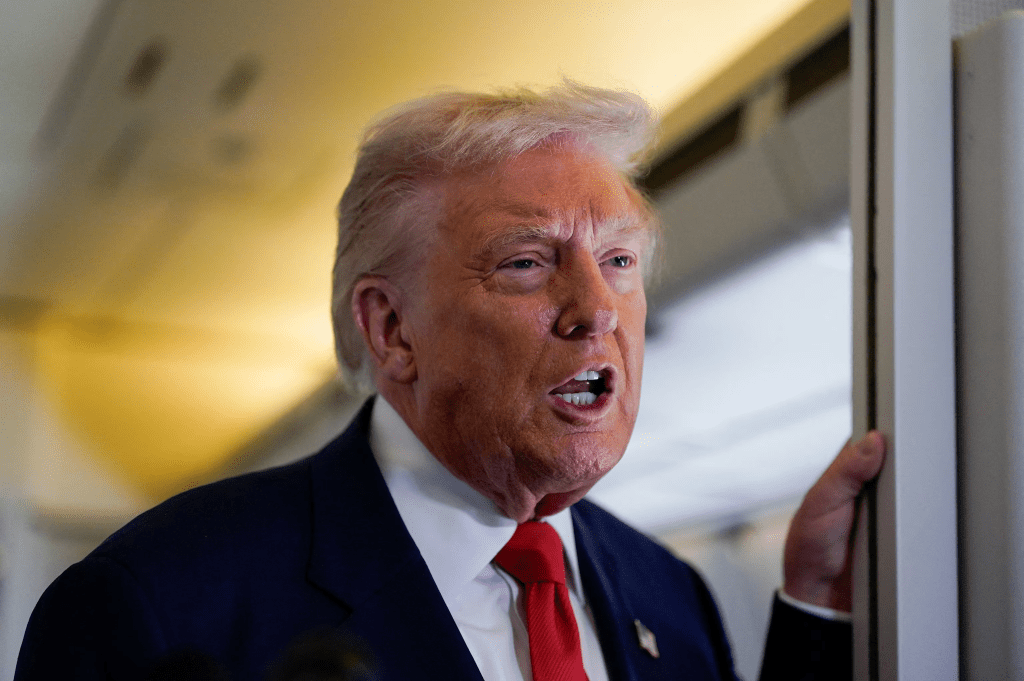
Strategically, timing matters. With the 2026 election cycle beginning to awaken and intra-party alignments being made, an early, public, high-profile endorsement helps define lines. It tells other Republicans in Tennessee and beyond: alignment with Trump matters. It signals to donors, volunteers, and activists that the candidate is not just a run-of-the-mill incumbent, but one with the blessing of the movement’s central figure. And for voters fatigued by insider politics, the message of loyalty and continuity may resonate powerfully.
The content of the endorsement also matters. Trump highlighted—or reiterated—core pillars that have defined his movement: growing the economy, cutting taxes and regulations, manufacturing in America, unleashing American energy dominance, securing the border, stopping migrant crime, strengthening the military and veterans, safeguarding elections, defending the Second Amendment. Each of these touches a core voter constituency: working-class manufacturing supporters, rural and suburban voters focused on security, veterans, gun rights advocates. By packaging Burchett as a proven performer across all these metrics, Trump not only boosts him but also implicitly critiques Republicans who may have drifted.
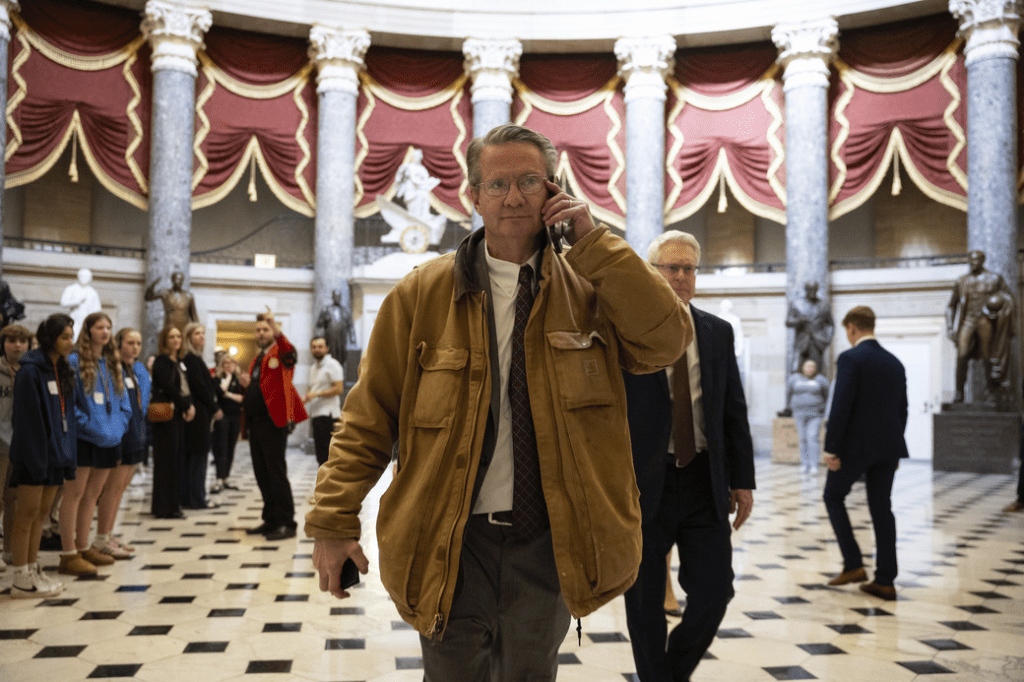
Yet an endorsement, even one from Donald Trump, is not a guarantee. For Burchett, delivering tangible results remains critical. Voters will ask: has the rhetoric translated into action? Has he advanced meaningful legislation or oversight? Has his advocacy produced measurable benefits in East Tennessee, especially for working-class families and veterans? Maintaining credibility will require that the campaign not rest solely on the Trump connection, but tie that to local stories—jobs created, veteran services improved, border-security initiatives supported. And within the broader GOP, Burchett faces a balancing act: staying true to core America First themes while engaging in governance and responding to constituent needs in a district that, while safe, still expects responsiveness and delivery.
For Trump, supporting Burchett aligns his future political capital with concrete, down-ballot races. As he ponders further ambitions, every seat held by his allies strengthens his leverage inside the party. The endorsement also reminds voters that Trump remains active, engaged, and influential—not a figure fading into the background. In many ways, endorsements like this one are less about the individual race and more about mapping the contours of GOP alignment for the next decade.
A closer look at the text of the endorsement reveals lines worth unpacking: “Tim has strongly served his Community with a career ‘loaded up’ with accolades and wins.” It emphasizes past performance, not promises. “Grow our Economy, Cut Taxes and Regulations, Promote MADE IN THE U.S.A., Unleash American Energy DOMINANCE, Keep our now very Secure Border, SECURE, Stop Migrant Crime, Strengthen our Military/Veterans, Safeguard our Elections, and Defend our always under siege Second Amendment.” Each phrase echoes major talking points of the GOP’s current right flank, and by listing them in one breath, the endorsement maps an integrated policy agenda rather than isolated issues. The phrase “always under siege Second Amendment” acknowledges gun-rights anxiety among conservative voters. The border language—“Keep our now very Secure Border”—posits a Trump-era achievement as baseline, implying that successors must build on it. Perhaps most compelling is the term “America First Patriot,” which binds Burchett to the Trump brand not just politically but ideologically.
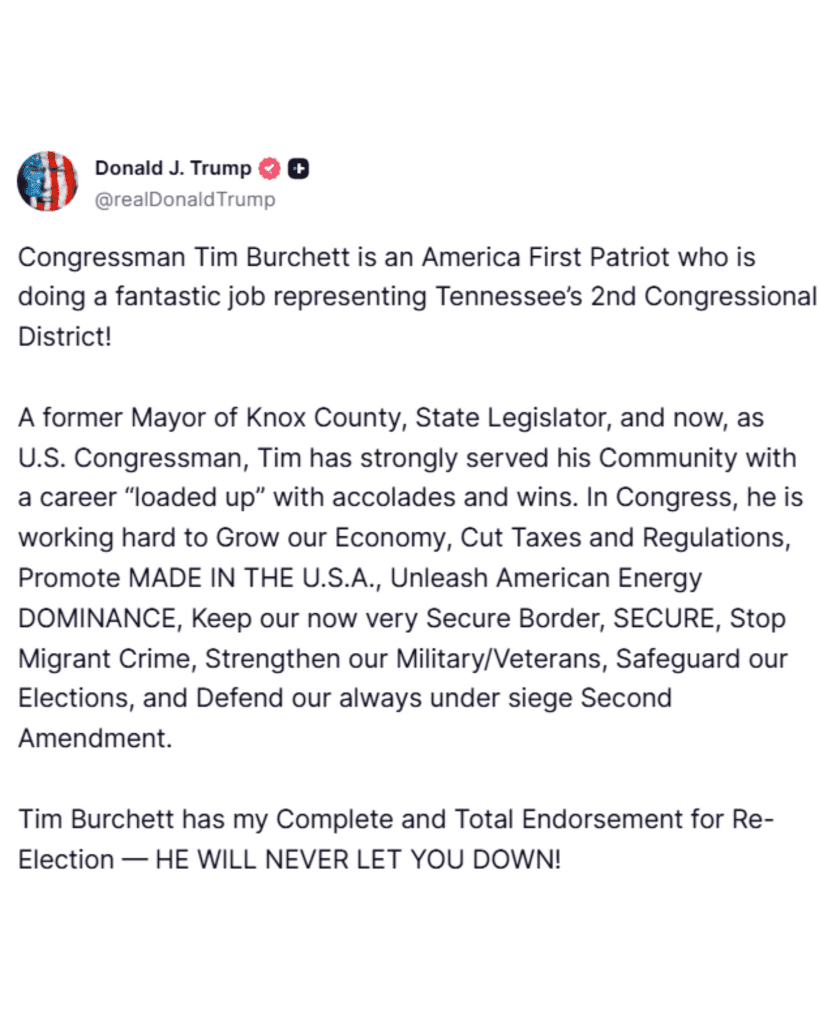
Looking ahead, the endorsement may catalyze several ripple effects. One: it may deter serious primary challenges to Burchett from the right, since challengers risk being portrayed as outside the Trump orbit. Two: it may encourage increased fundraising, as donors aligned with Trump look to support confirmed allies. Three: it may signal to other incumbents and potential candidates that early and public alignment with Trump pays. Four: for voters in Tennessee’s 2nd, it may sharpen the choice: do they back the trusted incumbent reinforced by Trump, or seek change outside that alignment?
It also raises questions for opponents and for Trump skeptics inside the GOP. Will voters in the district respond more to local performance or to national branding? Will Burchett’s record—while aligned with Trump—hold up under scrutiny? For the party at large, will the endorsement model of Trump become standard: early public declarations of fealty and loyalty, casting the former president as the central arbiter of GOP identity? If so, what does that mean for those Republicans who diverge from the America First line or prefer a more moderate path?
In essence, this endorsement is more than a routine photo-op. It is a statement of priorities, alignment, and momentum. For Trump, it reinforces his status; for Burchett, it offers validation and an elevated platform; for the Republican Party, it underscores that the America First doctrine remains central—even as questions of governance, delivery, and long-term strategy loom.
In the end, the outcome will depend on how well Burchett leverages the endorsement and translates alignment into action, how the Republican base receives the message in Tennessee’s 2nd District, and how opponents respond. But for now, the headline is clear: Donald Trump has thrown his weight behind Tim Burchett, tying his own political legacy—and future ambitions—to an incumbent who embodies the policy themes and populist impulses that defined Trump’s era. It is a moment that binds branding, strategy and local politics into one, and in doing so, sets the stage for what’s to come.
